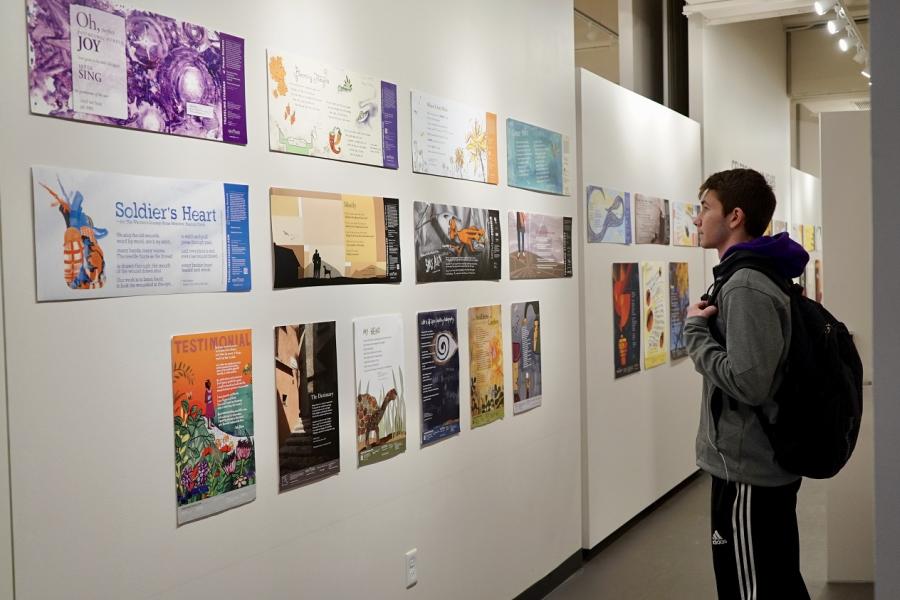Research & Science

Graduate Student Perseverance Leads to Published Research on Stress Related to May 4, 1970 Anniversary
How long does a single traumatic event affect a person’s mental health? Kent State graduate student Emily Rabinowitz’s research on this topic was recently published in the peer-reviewed Stress & Health: Journal of the International Society for the Investigation of Stress. Her paper “The 50th Anniversary of May 4, 1970, Is Associated With Elevations of Distress but No Increase in Mental Health Symptoms” was published in the November 2021 issue.

NSF Grant Leads to Modeling Novel Serial Robot Dynamics and Prototypes
The National Science Foundation recently awarded a two-year $198,978 grant to Tao Shen, assistant professor in the College of Aeronautics & Engineering, for the development of a compact, cable-driven serial robot that can be used in medical settings. Shen aims to build a robot with his students that will address the critical limitations that most current medical robots have.

Improving Police Training Through Stress Studies
Kent State University Professor Will Kalkhoff is studying the brain waves and heart rates of police officers during training exercises to help to improve police performance and increase safety. See the research in action.

Chirality Research: Will This New Insight Help Make Better Materials or Pharmaceuticals?
Chirality, or the absence of mirror symmetry in a molecule, is a complex topic that Material Sciences Professor Torsten Hegmann is determined to know more about. Hegmann, director of the Advanced Materials and Liquid Crystal Institute, and other Kent State collaborators led an international collaborative research project with contributions from a global team whose paper about the efficacy of chirality transfer in Science Advances may provide insights to make better materials or pharmaceuticals.

Understanding Impacts on LGBTQIA+ Communities from the COVID-19 Pandemic
Moira Armstrong, undergraduate in the College of Arts and Sciences and research assistant on the Queer Pandemic Project, collaborated with Molly Merryman, associate professor in the School of Peace and Conflict Studies, to compile digital, video-based oral interviews for the Queer Pandemic Project in a partnership between Kent State University, Goldsmith’s University of London and Queer Britain. These interviews feature people in queer communities across the United Kingdom, discussing the COVID-19 pandemic and how it has impacted their lives as queer people.

New Lab Combines Mixed, Virtual and Haptic Technologies To Provide Realistic Simulations for Students or Patients
Kent State has opened its newest research center, the IC Touch Lab, that will revolutionize the way medical students practice and patients rehabilitate. Headed by Kwangtaek Kim, assistant professor of Computer Science, the lab conducts various research projects involving haptic technology to expand the possibilities of medical and rehabilitation practices.

Student Researcher Identifies Potential Alternative to Antibiotics
During a summer research project at Kent State Geauga, nursing student Lauren Petrick succeeded in isolating a bacterial virus that shows promise as an alternative to antibiotics in fighting off intestinal bacterial infections such as urinary tract infections, GI tract infections and even pneumonia. By teaming up with Kent State Geauga Associate Professor Sanhita Gupta, Petrick tackled this problem through Kent State University’s Summer Undergraduate Research Experience (SURE) last summer.

Health and Well-Being of Students, Faculty and Staff Brought to Light by Healing Stanzas
Students across the nation were challenged as the pandemic swept the world. Healing Stanzas, a collaboration between the Wick Poetry Center, the Healthy Communities Research Institute and the Brain Health Research Institute, seeks to combine the science of brain health and public health with the creative energy of the humanities to provide Kent State students, staff and faculty with an opportunity to improve wellness through reflective poetry.

Kent State Graduate and Undergraduate Research Mentorship Awards Announced
Intentionality to build successful academic mentoring relationships with students is what sets professors apart at Kent State, and each year two professors at the graduate and undergraduate level receive a student-nominated award for their ability to do so. The intent of the award is to recognize those professors exceeding in mentoring students in how to perform research in any field.

Biophysics Professor Becomes the First Recipient at Kent State of an R35 Grant from the National Institutes of Health
The National Institutes of Health recently awarded a $1.86 million grant to Thorsten-Lars Schmidt to develop molecular tools that help researchers to understand membrane proteins. This is the first time a professor at Kent State has been awarded an R35, which provides promising researchers with a five-year funding for a broader research program, rather than funding a specific project. This gives investigators a lot of freedom to develop new research directions as opportunities arise, rather than being bound to specific aims of a more narrow study.